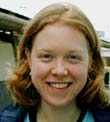Deborah Bakker is currently working at the Zero Emissions Research and Initiatives (ZERI) pavilion at EXPO 2000, the World’s Fair in Hannover, Germany. Previously she worked for the International Institute for Sustainable Development. Originally hailing from Ottawa, she currently calls Winnipeg, Manitoba, home.

Monday, 16 Oct 2000
HANNOVER, Germany
I’ve been here for just over a week, working at the Zero Emissions Research and Initiatives (ZERI) pavilion at the World’s Fair. The ZERI Foundation is a nonprofit organization established in 1996 in Geneva, Switzerland, with seven regional field offices scattered around the globe. The foundation’s goal is to encourage the efficient production of goods and services without any form of waste — no liquid waste, no gaseous waste, and no solid waste. Seven showcase ZERI projects are currently being displayed at our pavilion.
Today I am making final preparations for ZERI’s “International Day,” working with our press coordinator, a Swedish woman named Anna. Every day here at the EXPO, one pavilion is profiled, and tomorrow it will be ours. It’s basically a day for dignitaries and official ceremonies, for VIPs, ministers, and pavilion general commissioners to visit. It’s also a day for special presentations, tours, and cultural performances. Unlike other pavilions, ZERI’s doesn’t represent a country, but the “International Day” moniker is still being used to describe our big day.
Anna and I scoot about the sprawling EXPO grounds on our kickboards, confirming guided tours for the VIPs who will be visiting us tomorrow and checking in at the pavilions that have agreed to send a performer for the day-long cultural program we’re organizing. We have a stage booked with artists and musicians from 10 countries — including a Rajasthani dance troupe, the Pied Piper from Hameln, a drummer from the Central African Republic, Mexican balladeers, and Fijian fire dancers. Anna speaks four languages fluently (English, German, Spanish, and Swedish). I do the talking at all of the pavilions from French Africa.
Of course things take longer than we anticipate. Anna and I have a schedule; we intend to spend 30 minutes at each pavilion that we have to visit today, which includes transportation time. But when we walk to the African pavilions, time slows down. We must do business the African way, which fellow ZERI guides from Togo and Ivory Coast have told us about. We speak to Pierre at the Benin pavilion for a few minutes before finally getting to the point. We’d like to visit with his colleague who has worked with one of ZERI’s contacts — the Songhai Institute, a development NGO (non-governmental organization) in Benin that’s a center for research and training in sustainable agriculture, a common theme in ZERI projects. She’ll be back in 30 minutes. We wander over to the Uganda pavilion to visit Anna’s friend in the interim and stroll back through the market filled with throngs of goods and people.
When we return Ms. Amelie Assogba is there. She greets us warmly. I feel underdressed in my chinos and sneakers. Everyone here is wearing a suit or skirt. We go upstairs and sit down. I do most of the talking in French and translate for Anna. If you don’t mind, Amelie starts, can I ask you a few questions before we begin? Where are you from? What do you do? Why are you working for ZERI? Oh, that’s very interesting, may I get a copy of your thesis? After this introductory conversation, I reciprocate and ask her a few questions about herself. We finally get to the point of our visit. She did receive the invitation we sent out last week to present at the pavilion and would be interested in coming tomorrow. We discuss the structure and format of the talk, to be translated simultaneously. She takes us downstairs to show us art made from reclaimed metal and products made from waste tires and talk a little bit about environmental issues, sustainable development, and social and environmental problems in Benin, and how all of these relate to the displays at the pavilion. All three of us exchange addresses, get introduced to more people, and then say our goodbyes, which take a few minutes for each person.
Back at the pavilion I’m reminded of the adrenaline rush before other big events I’ve been involved in organizing. Did you call the Bolivian pavilion or did someone else? Where did you put the VIP delegation list? Press releases must be written and translated. Ingredients for breakfast must be bought. Signs must be made that say “Kein Engang” and “Geschlöten für 45 minuten” for those periods when the second level and bar will be closed off to visitors. The man at the copy shop knows us well.
We finally leave at about 11 p.m. During the 30-minute train ride back to the staff apartments, I have time to reflect and read more in the book Upsizing by Gunter Pauli, the founder and director of ZERI. News stories from home are few and far between. I understand only a smattering of the German radio. I vow to look for an English language paper, or to spend some time surfing the Internet for online news (if I can get to a computer) tomorrow.

